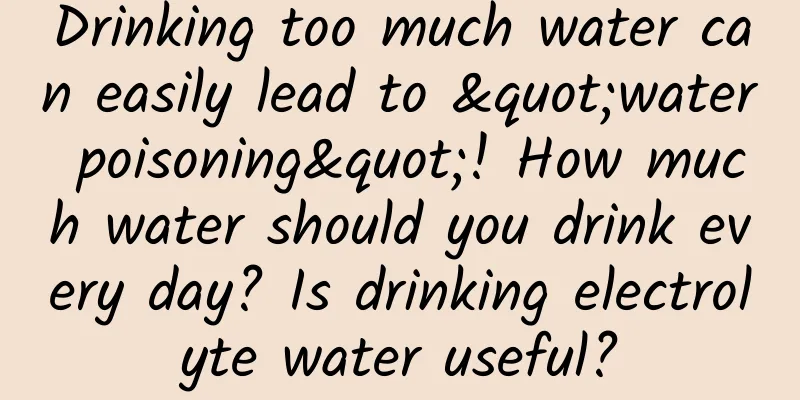Drinking too much water can easily lead to "water poisoning"! How much water should you drink every day? Is drinking electrolyte water useful?

|
Recently, a middle-aged woman was hospitalized for emergency treatment due to confusion. Doctors analyzed that it was caused by water intoxication due to excessive drinking of water after being infected with the new coronavirus. According to Red Star News, Yang Peng, an emergency doctor at Sichuan Provincial People's Hospital, said that the patient was infected with the new coronavirus around December 10 and developed symptoms of body aches, a fever of 39°C, and vomited twice. After vomiting, the patient began to drink a lot of water. "Family members described that she kept drinking water," and then developed symptoms of limb convulsions and confusion, and was rushed to the intensive care unit for emergency treatment. The patient had an emergency change in consciousness, which was considered to be caused by water intoxication after drinking a lot of water. Water intoxication, also known as dilutional hyponatremia, refers to when the total amount of water taken in by the body greatly exceeds the amount of water excreted, resulting in water retention in the body, causing a decrease in plasma osmotic pressure and an increase in circulating blood volume. On December 15, the reporter learned that after active treatment and care, the patient has now recovered, his COVID-19 symptoms have been cured, and he is expected to be discharged from the hospital soon. How much water should I drink every day? With the arrival of autumn and winter, respiratory diseases such as COVID-19 and influenza are prevalent, and many patients use drinking water to relieve symptoms. However, drinking water is also particular, and you need to control the degree and not drink too much. So, how much water is appropriate to drink every day? The Dietary Guidelines for Chinese Residents (2022) recommends that people drink enough water every day, in small amounts and multiple times. In mild climates, adult men with low physical activity levels need to drink 1,700 ml of water per day , and adult women need to drink 1,500 ml of water per day . In summer or when you sweat a lot, you should follow the three principles of fast first and slow later, replenish in batches, and measure out as much as in. Dr. Yang Peng said that for healthy people, drinking more than 3 or 4 liters of water in 24 hours may cause water poisoning. Drinking water in moderation is important, rather than drinking water without limit. It is safer to drink about two liters of warm water a day. For patients with chronic kidney disease and cardiovascular disease, the amount of water they drink needs to be properly controlled. Is it useful to drink electrolyte water when you have a fever? Speaking of "drinking water", there is one type of water that has become a hot commodity recently - electrolyte water . Electrolytes refer to inorganic salts, proteins, and other substances in body fluids that exist in the form of ions, mainly including potassium ions, sodium ions, chloride ions, calcium ions, magnesium ions, and the like. Water and electrolytes are components of the basic substances that sustain life, and are necessary conditions for maintaining the physiological functions of various organs of the human body. During a fever, excessive sweating and diarrhea may cause loss of water and some electrolytes, which can lead to dizziness, fatigue, and other symptoms of dehydration. In this case, proper supplementation of electrolytes is conducive to maintaining the stability of the patient's internal environment. In addition, the "Diagnosis and Treatment Plan for New Coronavirus Pneumonia (Trial Ninth Edition)" and the "Public Prevention Guidelines for New Coronavirus Pneumonia: Interim Guidelines for Dietary Nutrition" both mention "paying attention to water and electrolyte balance " or "appropriately supplementing drinking water containing a certain amount of electrolytes." Therefore, for those infected with the new coronavirus who are recovering at home, electrolyte water is not a "waste of money" and can indeed be of some use. However, experts also remind us that there are many ways to supplement electrolytes, not necessarily functional drinks. Foods containing potassium such as seaweed and spinach, and light salt water can all provide us with appropriate electrolyte supplements. If you can eat normally, there is no need to supplement electrolytes. Source: Beijing Daily WeChat Official Account |
>>: What should you eat and drink when you are infected with a virus and have a high fever?
Recommend
The latest progress of Tencent and Alibaba's "interconnection": Taobao is testing WeChat payment and supports screenshot jump
"Interconnection and interoperability" ...
Detailed explanation of the working principle of LiveData in advanced Android source code
[[422179]] This article is reprinted from the WeC...
99% of brand promotions are just scams?
What brands should do is to open the "door&q...
Lao A’s practical course on selling goods on Xianyu, simple, direct and rough, with original methods to help you sell goods on Xianyu
Lao A’s practical course on selling goods on Xian...
What is the “raw coconut” in raw coconut latte? Why is it so popular?
Unexpectedly, one year later, the concept of “raw...
Taking WeChat Reading as an example: 3 steps to effectively implement user growth strategy!
Nowadays, the work of product and operation is be...
Efficient strategy to recall lost APP users!
Before starting today's topic, let's talk...
The three chip giants have entered the autonomous driving market, and Chinese manufacturers such as Huawei have made a single breakthrough and are facing the ultimate test
Qualcomm, Intel and Nvidia, the three giant chip ...
With these new ways to play H5, are you still worried about running out of inspiration?
Understand the new capabilities and gameplay brou...
Not only does white porridge not nourish the stomach, but drinking it for a long time can actually damage the stomach!
Recently, Dr. Zhang Wenhong, who is on par with Z...
How can 300 million short video creators break through in 2021?
In recent years, short video platforms have occup...
Can pine pollen fight cancer, prevent aging, and treat cardiovascular disease? Don’t be fooled!
"Pine pollen can fight cancer, prevent aging...
Qianwanshe's new short video money-making project: Douyin emoji package leads to 20,000 yuan a month
Moreover, I didn’t invest a penny. Since the emot...
A super comprehensive operation plan for Chinese Valentine's Day!
This article takes an education and training ente...
What is NATO? What is the feud between NATO and Russia?
Mixed Knowledge Specially designed to cure confus...









